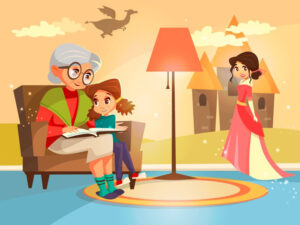Registered with the Registrar of Newspapers for India under R.N.I 53640/91
Vol. XXXI No. 16, December 1-15, 2021
Not so happily, ever after, after all
by Ranjitha Ashok

Watching your old friend-from-school tell her grandchild stories?
So you’re probably in a syrupy, sentimental how-time-flies-what-an-adorable-image state of mind?
Look again.
See those lines on her face?
No, she didn’t have them yesterday.
Come to think of it, she seems to be collecting lines and furrows rather speedily these days.
Bound to happen.
That’s what storytelling to a bunch of smart younglings in 2021 can do to you.
There was a time when elders told you stories; you just listened, laughed, or got terrified, bawled your eyes out and then went out to play.
Not anymore.
Let’s just say you’re story-teller-in-charge of the younger set of grandchildren this evening.
You begin with a golden oldie. (Okay, confess – you went out for a ‘ladies’ lunch’, then hit the gym, forgot to brush up on your stories, and now have run out of options. Really, grandmothers in the 21st century!)
Anyway – so you start with Goldilocks.
Simple. Straightforward.
Not really.
“Goldilocks went into the pretty little cottage.”
“Why?”
“Er…she was tired.”
“Wasn’t she scared?”
“No, I guess not.”
“But how could she go into a stranger’s house without permission? And eat stuff when she didn’t know what’s in it?”, this from the nuclear family uber-urbanite large, maze-like apartment complex dweller.
Having never viewed these stories from this angle, you need a second to think that through.
Today, Hansel and Gretel will not merely bite off bits and pieces of the cottage, the good lady (please note!) will invite them in and give them steaming hot chocolate to wash it all down, while they watch their parentally-approved TV shows.
And the wolf will probably run ahead of the little girl in red, making sure her path is free of pebbles and thorns.
It gets even better when you help yourself to stories from mythology. Attitudes towards blood and gore have changed. Young parents, who, when they still operated as your kids, had no problem with violence and mayhem in stories, have now gone all millennial on you, and tend to look askance at heads being sliced off, at new-borns who are seen as potential danger being despatched at birth, or little ones being slapped so hard their jaw lines change forever.
Incidentally, how come you never realised how steeped in inappropriate-for-young-ears violence these stories have always been?
So you find yourself editing as you go.
“The wicked uncle picked up the newborn and…er…um…sent it far away.”
Or, when you say, “And he made himself as small as an ant, flew into the monster’s mouth and…”, you think you sense a slight uneasiness in the air, so you brake, shift gears and turn it into something like: “And then he…he…er…bounced up and down inside that monster’s nose and escaped when the bad guy sneezed.”
Gales of laughter and falling about.
Well, okay – maybe that was better than saying the good guy got out by tearing open the bad guy’s stomach, because that was the only way that sorry excuse for a life could have been killed.
And that’s another thing.
“And the poor broken-hearted king died of sorrow.”
“You mean he became a star?”
“Well…”
“Amma says when people die, they become stars.”
“Well, okay, fine, then yes, the king became a star.”
“When will you and Thatha become stars, Paati?”
A logical thought progression, but suddenly being brought slap up against your own mortality shocks you into silence for a bit.
“And the queen was very angry and said her son must be king.”
“Didn’t she know you mustn’t throw tantrums?”
You admit that there does seem to have been a major flaw in that particular queen’s upbringing.
If you say, “…and that person was so stupid,” you are told: “Mustn’t call anyone ‘stupid’.”
“She was very fat”, will probably earn you a censorious, “Mustn’t call anyone that.”
To be fair, their world is far more ultra-touchy than the rough-and-tumble one you grew up in, and they’re just trying to make appropriate adjustments.
They are also right in many ways, and you are willing to learn and change, while remembering how you laughed your head off over Laurel and Hardy, and closer home, ‘Pakoda’.
Very aware, the little ones these days.
And you ask yourself – how come you never wondered if it was okay for a stranger to kiss someone when she was sleeping? Or how come princes never needed rescuing? Surely they must have made some bad judgement calls too, like accepting apples from strangers, going into the woods alone, or closer home, granting boons rashly, especially when you knew that person’s track record of generally anti-social behaviour. Also, why did all the good people have to be drop-dead gorgeous? Look around – you see how unrealistic that is?
You look back at your unquestioning acceptance of every story that was told to you, and wonder.
Innocence? Naivety?
Or just a simpler world?

